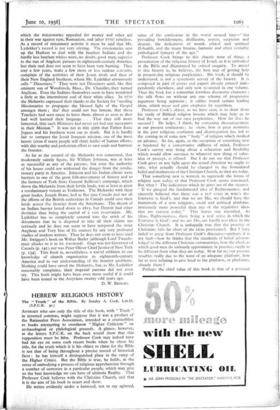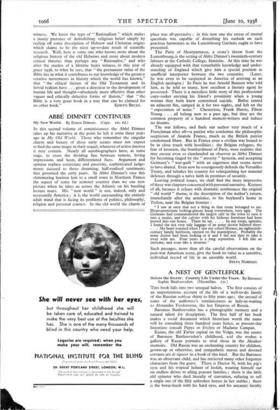HEBREW RELIGIOUS HISTORY
The " Truth" of the Bible. By Stanley A. Cook, Litt.D. (S.P.C.K. 9s.) ANYBODY who saw only the title of this book, with " Truth " in inverted commas, might suppose that it was a product of the Rationalist Press Association, intended as a counterblast to books attempting to overthrow " Higher Criticism " on archaeological or philological grounds. A glance, however, at the letters S.P.C.K. on the back would show that this supposition must be false. Professor Cook may indeed have had his eye on some such recent books when he chose his title, for the truth which it is his object to claim for the Bible is not that of being throughout a precise record of historical facts : he has himself a distinguished place in the camp of the Higher Critics. But the Bible is true, he holds, in the sense of embodying a process of religious apprehension through a number of centuries in a particular people, which may give us the best knowledge we can have of ultimate Reality. That Professor Cook believes with the Christian Church, and that it is the aim of his book to assert and show.
He writes evidently under a harassed, not to say agitated,
sense of the confusions in the world around him—" the prevailing bewilderment, disillusion, unrest, suspicion and despair, the indications of moral, ethical and spiritual ill-health, and the many bizarre, fantastic and often veritably pathological features of the age."
Professor Cook brings to this chaotic state of things a presentation of the religious history of Israel, as it is embodied in the Bible and illuminated by critical enquiry. To attend to this history is, he believes, the best way of getting help in present-day religious perplexities. His book, it should he understood, is not a systematic survey of the history. It is composed in part of essays and papers already printed inde- pendently elsewhere, and only now re-united in one volume. Thus the book has a somewhat formless discursive character ; the talk flows on without any one scheme of progressive argument being apparent ; it eddies round certain leading ideas, which recur and gain emphasis by repetition.
Professor Cook's object, as we have seen, is to draw from his study of Biblical religion lessons which may help us to find the way out of our own perplexities. How far does he succeed ? He helps, I think, by correcting discouragement at our present confusions ; he shows how at great moments in the past religious confusion and disintegration has led to the coming in of some new " body " of religion which marked an advance. So far, again, as the reception of something new is hindered by a conservative stiffness of mind, Professor Cook's survey may bring about a relaxation and flexibility which would allow entrance to whatever new thing of value, idea or precept, is offered. But I do not see that Professor Cook gives us any light upon the actual direction we ought to take, what actually should be changed in the formulated belief and institutions of the Christian Church, as they are today.
That something new is wanted, to supersede the forms of religion seen today, of that Professor Cook seems convinced. But what ? The indications which he gives are of the vaguest. " If we grasped the fundamental idea of Righteousness, and sincerely believed that there was a real sense in which the Universe is God's, and that we are His, we should have the framework of a new religious, social and political platform, immensely more powerful than any of the regulative ideas that are current today." This leaves one mystified. As ideas, Righteousness, there being a real sense in which the Universe is God's and we arc His, are hardly new ideas in the Christian Church. It is unhappily true that the practice of Christians falls far short of the ideas proclaimed. But I have failed to grasp from Professor Cook's discourse—perhaps it is my fault—how he thinks that the standards of belief acknow- ledged in the different Christian communities, how the ideals to which good men do variously approximate in practice, ought to be different from what they are today. How far arc our present troubles really due to the want of an adequate platform, how far to men refusing to give heed to the platform, or platforms, already there ?
Perhaps the chief value of this book is that of a personal witness. We know the type of " Rationalism " which makes a jaunty pretence of demolishing religious belief simply by reeling off some description of Hebrew and Christian origins which claims to be the most up-to-date result of scientific research. Well, here is some one who knows more about the religious history of the old Hebrews and more about modern critical theories than perhaps any " Rationalist," and who after the studies of a lifetime bears witness, in this year of grace 1938, to what he sees, that " the permanent value of the Bible lies in what it contributes to our knowledge of the greatest creative movements in history which the world has known," that " the ethical theism of the Old Testament and its fervid realism have . . . given a direction to the development of human life and thought—absolutely more effective than other vaguer and ethically defective forms of theism," that " the Bible is a very great book in a way that can be claimed for











































 Previous page
Previous page